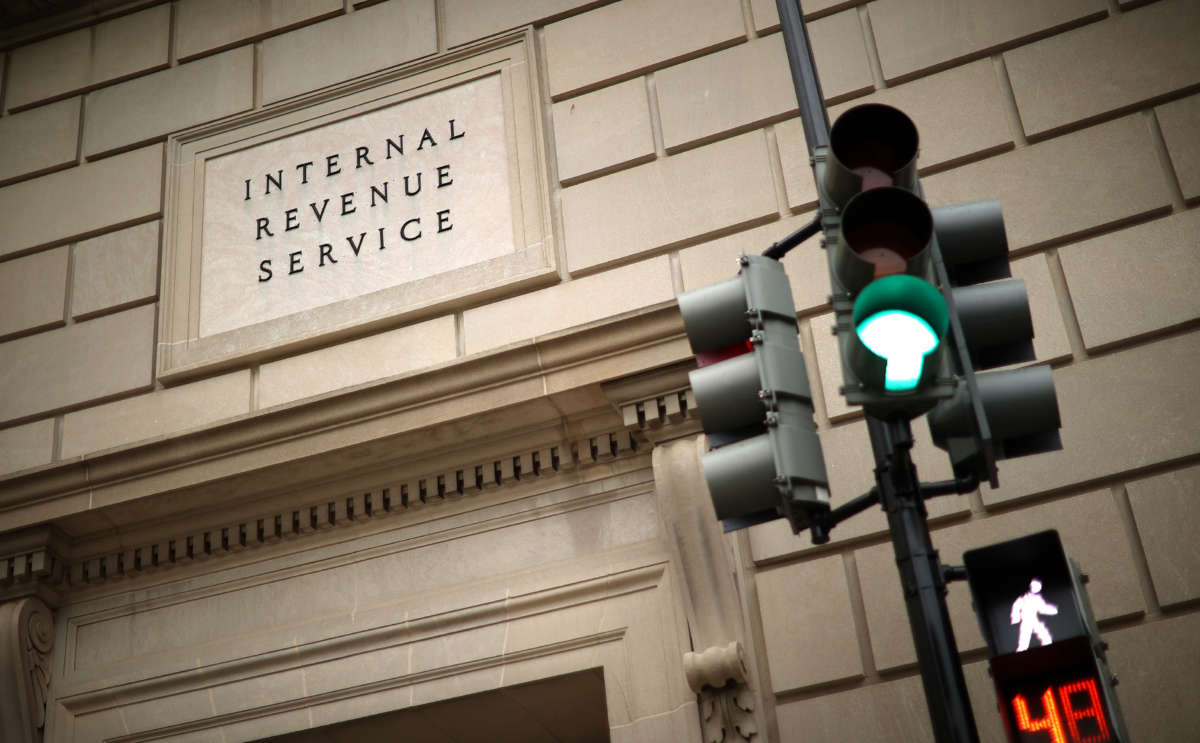Honest, paywall-free news is rare. Please support our boldly independent journalism with a donation of any size.
The Biden administration is proposing hiring 87,000 new workers for the Internal Revenue Service (IRS), effectively doubling the agency’s size, as part of a plan to beef up enforcement efforts and find billions of dollars in tax revenues that go uncollected each year.
Enforcement efforts would primarily target individuals and corporations with higher incomes and profits, the administration has suggested.
The hiring, which would be part of President Joe Biden’s overall $80 billion spending plan to increase enforcement efforts at the IRS, would not happen all at once. Instead, it would be carried out in phases, with a 15 percent growth in employment at the agency per year until that 87,000 hiring benchmark is reached.
The move would help recoup (and go beyond) some of the employment losses the agency has seen over the past decade, as the IRS has lost more than 33,000 workers over the past decade. The drop in employment at the agency has resulted in fewer audits, particularly for filers with higher incomes.
If successful — and, if the IRS is able to step up its enforcement efforts — tax collectors may be able to generate an additional $700 billion over the next decade alone, the Biden administration has claimed, which could help pay for the president’s ambitious spending bills regarding infrastructure and aid to U.S. families.
The administration’s aim for greater IRS enforcement, and the net benefits that would come from it, has received support from Democrats in Congress.
Sen. Elizabeth Warren (D-Massachusetts) hailed the idea of increasing IRS enforcement earlier this week, noting that enforcement efforts over the past 10 years of staffing decreases at the agency have led to less frequent audits for the wealthy with more frequent audits for marginalized communities.
“The IRS is so starved for resources that it targets people who are cheapest to audit: low-income taxpayers, and often people of color,” she explained on Twitter.
Economists have said, however, that the IRS is missing out on potentially large sums of money by not going after wealthy tax dodgers instead. Research has found that the top 1 percent of tax dodgers avoid as much as $5 trillion over a decade.
Rep. Conor Lamb (D-Pennsylvania) also supported efforts to increase enforcement, as the current system disproportionately affects working-class families.
“Why should a pipefitter or teacher have to pay all their taxes, while big companies just evade the IRS? If we just enforce the law equally, the pipefitters and teachers will be treated equally and we’ll have money left over to fund infrastructure and schools,” Lamb said.
Republicans have for decades attempted to discredit the IRS, making it out to be a bogeyman to their base and anyone who would listen to them, resulting in drastic cuts to the agency over the years. Odd budget rules set by lawmakers in Congress in the past have also made it impossible to demonstrate, through the Congressional Budget Office’s published analyses, how much increased enforcement could actually help when it comes to issues like the debt or yearly deficit spending.
The right has already begun efforts to stop Biden’s plan for greater scrutiny of wealthier Americans’ tax filing. A political action committee called the Coalition to Protect American Workers, a GOP-aligned group with ties to former Vice President Mike Pence, has started running commercials aimed at garnering opposition to the White House’s plan, describing the hiring increases in one advertisement as an attempt to “recruit an army of IRS agents.”
But Republicans’ motives for running such ads might be selfish — many of them are part of the 1 percent themselves or receive donations from corporations that could be affected by IRS crackdowns, meaning that new enforcement rules might mean less money in the GOP’s own wallets.
A terrifying moment. We appeal for your support.
In the last weeks, we have witnessed an authoritarian assault on communities in Minnesota and across the nation.
The need for truthful, grassroots reporting is urgent at this cataclysmic historical moment. Yet, Trump-aligned billionaires and other allies have taken over many legacy media outlets — the culmination of a decades-long campaign to place control of the narrative into the hands of the political right.
We refuse to let Trump’s blatant propaganda machine go unchecked. Untethered to corporate ownership or advertisers, Truthout remains fearless in our reporting and our determination to use journalism as a tool for justice.
But we need your help just to fund our basic expenses. Over 80 percent of Truthout’s funding comes from small individual donations from our community of readers, and over a third of our total budget is supported by recurring monthly donors.
Truthout has launched a fundraiser, and we have a goal to add 273 new monthly donors in the next 72 hours. Whether you can make a small monthly donation or a larger one-time gift, Truthout only works with your support.
